HVAC Maintenance: Everything Homeowners Must Know to Prevent Damage & Increase System Longevity

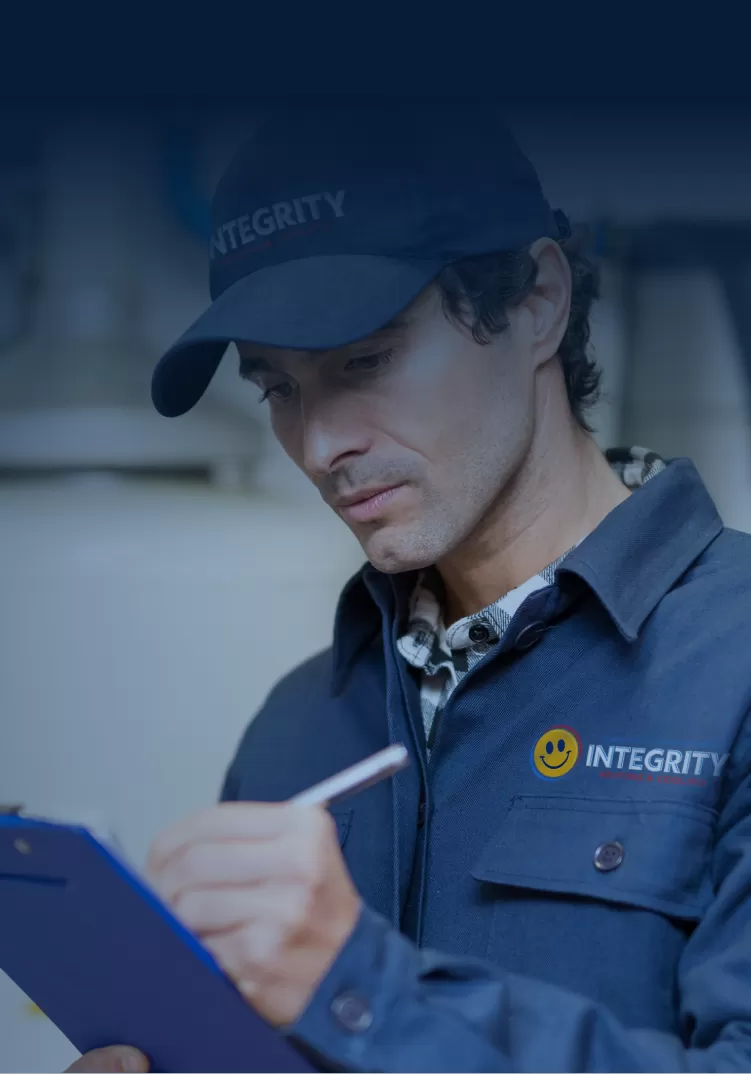
HVAC maintenance doesn’t just keep your unit running smoothly; it can also help prevent damage and increase its longevity, saving you hundreds of dollars in the long run. By taking a proactive approach to HVAC system maintenance, homeowners can avoid unexpected issues, improve indoor air quality, save money on their utility bills, and enjoy an overall more reliable heating and cooling system.
In this article, we will provide an overview of the various types of maintenance, why HVAC maintenance is important, what maintenance includes, and a comprehensive HVAC preventative maintenance checklist for every season. With a better understanding of how to take care of your HVAC system, you’ll ensure that it runs reliably and efficiently for many years to come!
Types of HVAC Maintenance
To keep your heating and cooling systems running efficiently and prevent breakdowns, it is essential to have regular HVAC system maintenance. There are several types of HVAC maintenance, each with its own benefits and drawbacks. From reactive maintenance that addresses issues as they arise, to predictive maintenance that uses advanced technology to anticipate problems before they occur, we’ll explore the five most common types of HVAC maintenance to help you choose the best approach for your home.
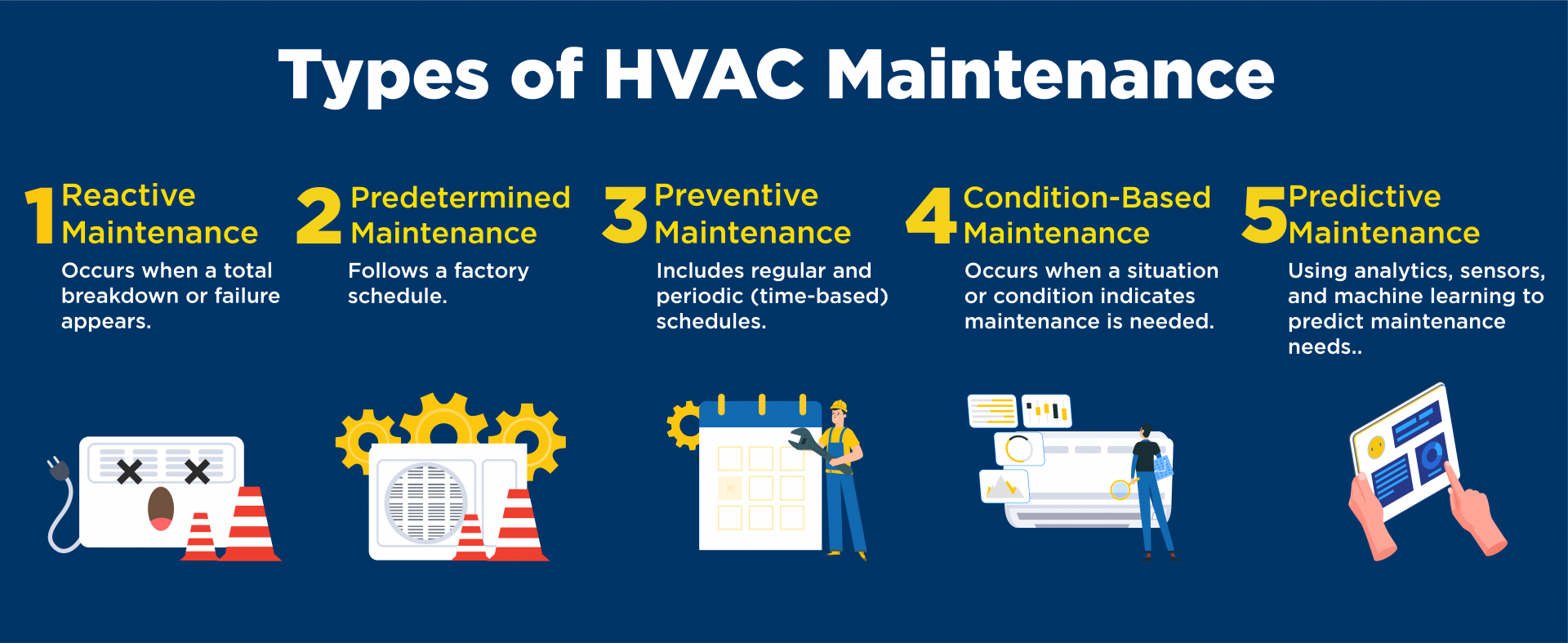
Reactive Maintenance
Reactive maintenance, also known as run-to-failure maintenance, involves fixing issues when they occur, rather than following a regular maintenance schedule. Initially, it can be a lower-cost way to address issues and keep your HVAC system functioning properly. However, relying solely on reactive HVAC maintenance can lead to more frequent breakdowns and the need for more expensive repairs.
For HVAC systems that have low rates of failure or are less costly to repair or replace, it may be safe to stick with reactive maintenance, as long as you remain aware of the potential long-term costs.
Predetermined Maintenance
Predetermined maintenance is a proactive approach that involves scheduling regular maintenance tasks at fixed intervals, regardless of whether your HVAC system is experiencing issues or not. Most often, homeowners opt for this type of HVAC maintenance for their most important heating and cooling systems, the ones that are crucial to keeping their family safe and comfortable, and also systems that experience higher levels of wear and tear.
Scheduling regular maintenance helps to reduce the chances of unexpected breakdowns and will help to extend the lifespan of your HVAC systems. However, since it is scheduled in a regular cadence regardless of usage or need, predetermined maintenance may not be necessary for all HVAC systems, resulting in wasted time and money.
Preventive Maintenance
Though similar to predetermined maintenance, preventive HVAC maintenance includes tasks that are specifically based on the equipment's condition and usage. Because it is more tailored to the usage and condition of the HVAC system, this type of maintenance can help catch potential problems and prevent major issues or breakdowns. By scheduling preventive HVAC maintenance, you’ll also ensure that your system remains as efficient as possible.
Homeowners often schedule preventive maintenance at a regular cadence, just like predetermined maintenance, to ensure that it is done at the right times of year for their heating and cooling systems. All HVAC systems can benefit from preventive maintenance, especially those that are the most needed to maintain comfort and safety in your home.
Condition-Based Maintenance
Condition-based maintenance involves monitoring your HVAC system's performance in real-time using sensors and other technology. This approach allows you to identify potential issues as they arise and take steps to address them proactively before they become major problems.
Condition-based maintenance can be a highly efficient way to maintain your HVAC system. By being alerted to changes in how your system is operating, you can quickly address them, helping you to avoid breakdowns. However, because this equipment only notifies you when changes occur, normal wear and tear can fail to be detected. The equipment is also expensive to install and requires techs who are trained to read and interpret the data it provides.
Predictive Maintenance
Predictive maintenance takes condition-based maintenance a step further by using advanced analytics, sensors, and machine learning to predict when maintenance will be needed. This type of maintenance is highly effective for identifying potential problems before they occur and planning maintenance tasks. By staying ahead of any issues, predictive maintenance enables HVAC systems to operate efficiently and reliably, reducing both energy and repair costs.
Because of the equipment required, predictive HVAC maintenance systems have high upfront costs and require a tech with specialized knowledge to perform the installation. Predictive HVAC maintenance is most common in commercial settings where a facility manager needs to manage multiple HVAC systems.
What Are the Benefits of HVAC System Maintenance?
Maintaining an HVAC system is important for many reasons. Not only does it help to ensure that your system operates efficiently and smoothly, but it can also have a significant impact on your wallet. By properly maintaining your HVAC system, you can improve indoor air quality, reduce energy costs, extend the lifespan of your HVAC unit, and avoid costly emergency repairs. In this section, we'll take a closer look at the benefits of maintaining your HVAC system and why it's so important to prioritize regular maintenance.
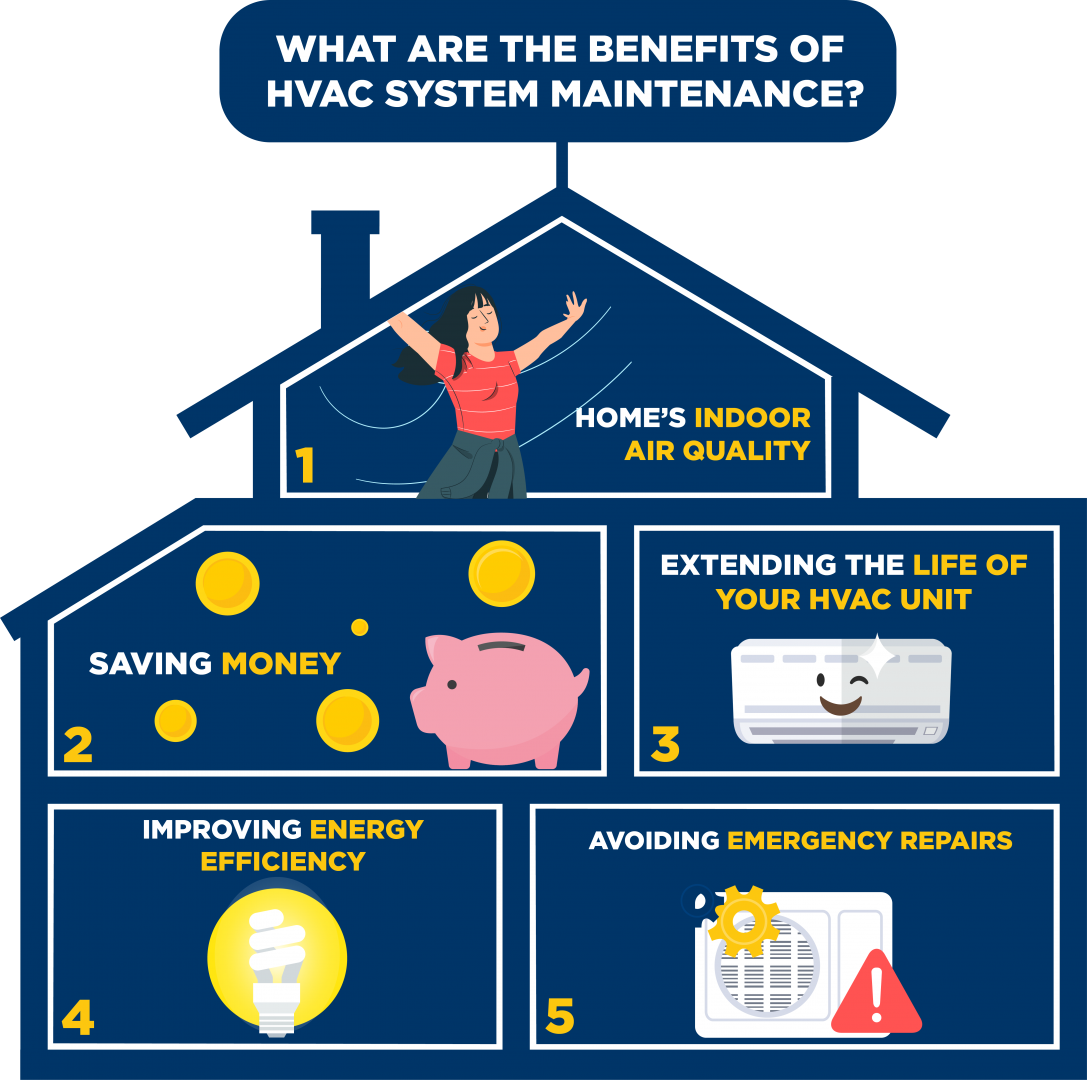
Improving Your Home’s Indoor Air Quality
The air filters in HVAC systems are designed to trap dust and dirt particles, which can accumulate over time and affect indoor air quality. It's important to regularly change these filters to maintain clean air and prevent contaminants from being circulated throughout your home. Leaks or other issues in the system can lead to the growth of harmful mold and bacteria, and when an HVAC system isn't functioning well, it may not circulate air as effectively.
Poor indoor air quality can have a significant impact on your health, causing respiratory problems, allergies, and other health issues. By scheduling regular HVAC maintenance services, you can ensure that your system will filter out pollutants and contaminants, increase airflow and circulation, and you’ll reduce the chances of mold or bacteria growth - all improving the air quality in your home and creating a healthier living environment.
Saving Money with Preventive Maintenance
The average household spends more than $2,200 a year on energy bills, with nearly half of this going to heating and cooling costs. The good news is, maintaining your HVAC system can help you save money in several ways. A well-maintained HVAC system operates more efficiently, which means that it uses less energy, helping you to lower those energy bills. Additionally, regular heating and AC maintenance can help you avoid the need for costly repairs and replacements down the line. HVAC repair can be expensive, especially if the problem has been neglected for a long time.
By partnering with a trusted HVAC technician and creating a maintenance plan that works for your needs, you can keep your heating and air conditioning system in tip-top shape and enjoy the savings that come with it.
Extending The Life of Your HVAC Unit
Neglecting regular maintenance can cause your HVAC unit to work harder and wear out more quickly, which can potentially lead to a shorter lifespan. Additionally, when maintenance is performed on a heater or air conditioner, the units are checked for leaks or small issues and can be repaired quickly, keeping your unit from suffering from unnecessary damage.
Regular heating and AC maintenance, such as replacing filters and cleaning coils, can help to keep an HVAC unit running efficiently, preventing breakdowns and extending its lifespan. Overall, maintenance is an investment in the longevity of your system and your overall comfort at home.
Improving Energy Efficiency
Regular HVAC maintenance service can also improve the energy efficiency of your heating or cooling system. By cleaning and lubricating components, replacing dirty filters, and getting a tune-up, you’ll help your HVAC unit to operate more efficiently, resulting in less energy usage and lower energy bills. In fact, according to the EPA, you can save 10-15% of your air conditioner’s energy consumption just by changing the air filter.
A more energy-efficient HVAC system is also better for the environment, lowering your reliance on fossil fuels and reducing waste. With savings on energy bills and a reduced carbon footprint, increased energy efficiency is just one more benefit of HVAC maintenance.
Avoiding Emergency Repairs
Regular HVAC maintenance is said to reduce the risk of breakdown by as much as 95%. During a maintenance service, minor issues are caught early and can be addressed before they become major problems. Additionally, when all the parts of your heating and air conditioning systems are clean and well-lubricated, they experience less wear and tear and are less likely to break.
By scheduling annual HVAC maintenance for your heater or AC unit, you’ll avoid unexpected breakdowns and have peace of mind that your family will be comfortable and safe all year long.
What Does HVAC Maintenance Include?
During a preventive HVAC maintenance visit, a technician will thoroughly inspect and clean various components of your heating, ventilation, and air conditioning system.
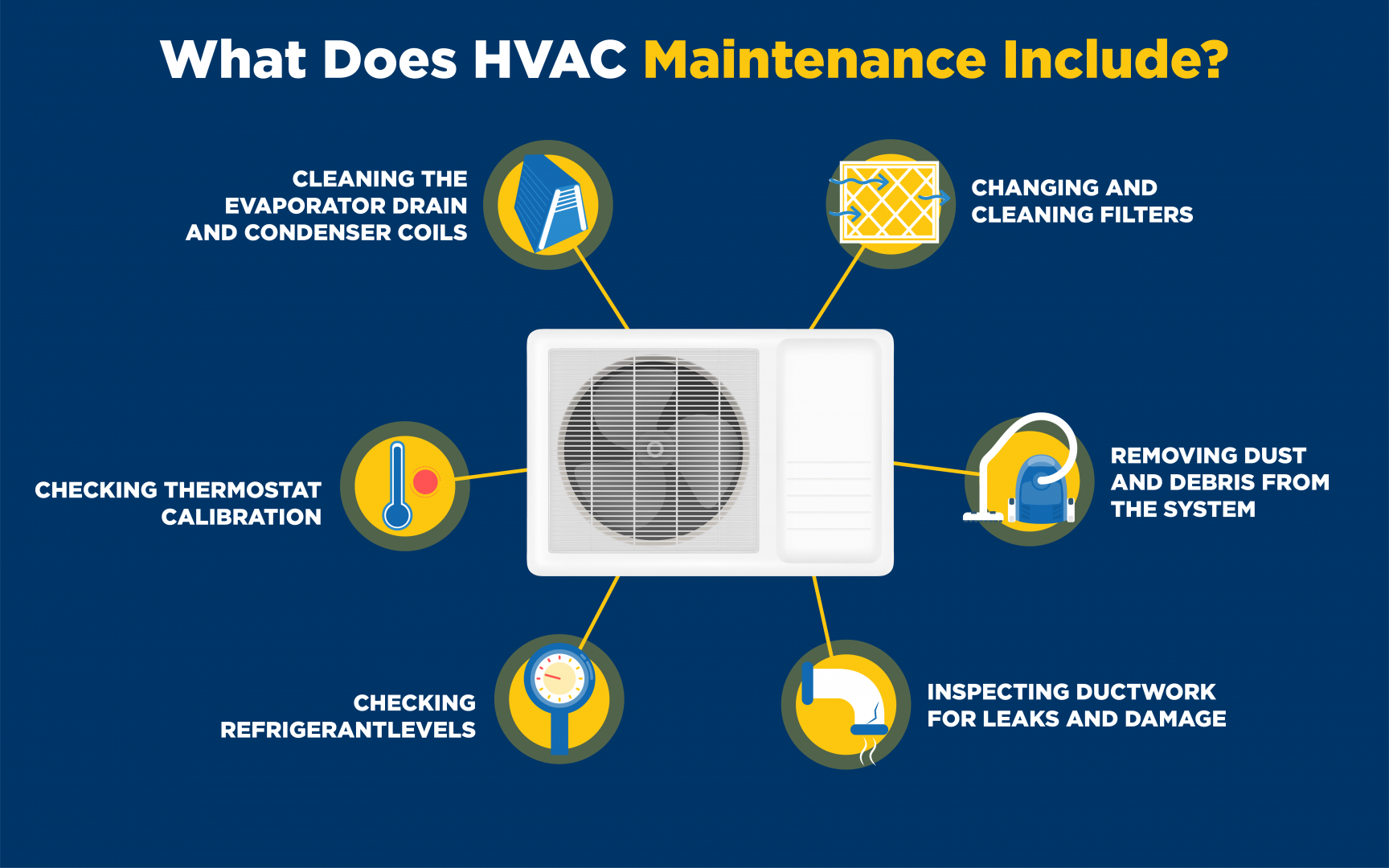
The technician will check the system for any signs of wear and tear, as well as any potential issues, helping to prevent costly breakdowns and repairs down the line. Additionally, an HVAC technician can forecast when it might be time to replace your system.
Overall, a preventive maintenance visit typically takes a few hours to complete, depending on the size and complexity of your system. To ensure that your system is running efficiently and effectively, it's recommended to schedule a maintenance check for each HVAC unit at least once a year, ideally before the start of the heating or cooling season.
Heating System Maintenance
When it comes to heating system maintenance, it's important to have a certified HVAC technician inspect and test your furnace or boiler on a regular basis.
During a maintenance service, the technician will carefully review the heater's exterior and vent system and replace the furnace filter if necessary. Next, the furnace's internal components will be thoroughly cleaned and inspected for any deterioration or damage. This includes the ignition assembly, fan, motors, and pressure switches. For those with a boiler, the controls, pump, low water cutoff, sight glass, and safety devices will also be checked.
The technician will also test the energy consumption of your furnace and electrical components to ensure efficient operation. Additionally, the thermostat in your home will be checked and calibrated to prevent issues during the season.
Finally, the HVAC maintenance professional will inspect your system for carbon monoxide leaks and proper ventilation to ensure the safety of you and your family. Overall, heating system maintenance can take anywhere from 60 to 90 minutes and is well worth the time to ensure your system operates efficiently and safely.
Seeking professional heating maintenance in Illinois?
Cooling System Maintenance
When it comes to your air conditioner, regular maintenance is the best way to ensure that your cooling system will run efficiently and reliably all summer long. When you schedule AC maintenance, a certified HVAC technician will inspect both the interior and exterior components of your air conditioning system, including motors, belts, and filters.
Filters will be cleaned, or replaced if needed, to remove harmful microbes that can pose a risk to human health like bacteria, viruses, fungi, dust, and debris. The HVAC professional will also measure the coolant level in the air conditioner and replace it if it's low. This is important as low coolant levels can cause the air conditioner to work harder, decreasing efficiency and increasing wear and tear.
To ensure they are in good working condition, the technician will inspect all circuits, the drain line, the condensate pump, covers, valves, and safety devices. They will also check the electrical components of the HVAC system for signs of wear and tear. If any issues are found, the technician will be able to repair or replace them in order to prevent any fire hazards or power failures from occurring.
Lastly, the technician will check that the outdoor unit is properly aligned to ensure optimal performance throughout the season. The duration of a cooling system maintenance check can vary depending on the size and complexity of the system, but it typically takes a few hours.
Seeking professional cooling maintenance in Illinois?
HVAC Maintenance Checklists
You should have each of your HVAC systems checked at least once a year - air conditioning systems in mid-spring and heating systems in the fall. You’ll be able to identify and address any issues before they become more significant problems and optimize your system for efficiency. Having a maintenance plan will ensure that your air conditioner is primed for the summer and that your heating system is all ready to keep you warm all winter long.
Spring and Summer Maintenance Checklist
By late spring, your heater will be ready for a good cleaning after working hard all winter long. Maintenance is also an important way to make sure your air conditioning system is ready for the summer season. Here are some things to do before summer begins:
Replace or Clean Filters: After the heating season is over, your heating filters will most likely need to be replaced. Depending on the thickness of the filter, it should be replaced anywhere between 2 - 9 months. You’ll also want to check your AC system filters and wipe off any dust that may have accumulated over the winter with a damp cloth.
Clean Vents: To clean your vents, turn off your HVAC system, remove duct covers and use a vacuum to remove as much dust and debris as possible. If there seems to be a large amount of buildup, schedule professional duct cleaning with an HVAC technician.
Check Refrigerant Levels: Check your AC unit’s user manual for the appropriate pressure and temperature ranges for your system. After checking the refrigerant lines for cracks or leaks, gauges can be attached to the service valves to measure refrigerant levels. A professional HVAC technician can check your refrigerant levels and add more refrigerant if necessary.
Clean Evaporator and Condenser Coils: Handy homeowners can clean these components by using a soft brush and wet/dry vacuum to remove dirt and debris. You can also get a specially-formulated coil cleaner which can be used to remove any additional residue. An HVAC technician can also clean the outdoor condenser during a maintenance visit.
Check and Clean Condensate Drain: The condensate drain is typically located near the evaporator coil, inside the indoor air handler of an AC unit. Check the drain for any clogs, which can be removed using a wet/dry vacuum, and rinse with warm water and mild soap. Additionally, check the drain pan for any standing water or debris. This task can also be handled by an experienced HVAC technician.
Next, do a quick inspection of all of your heating and cooling units, looking for cracks and leaks, removing brush and debris from around the outdoor AC condenser, and checking the thermostat to make sure it’s working correctly.
Finally, schedule an HVAC tune-up with a professional. An HVAC technician will perform a comprehensive inspection of your heating and cooling system, identify any potential problems, and make any repairs that may be needed to keep your system running in tip-top shape.
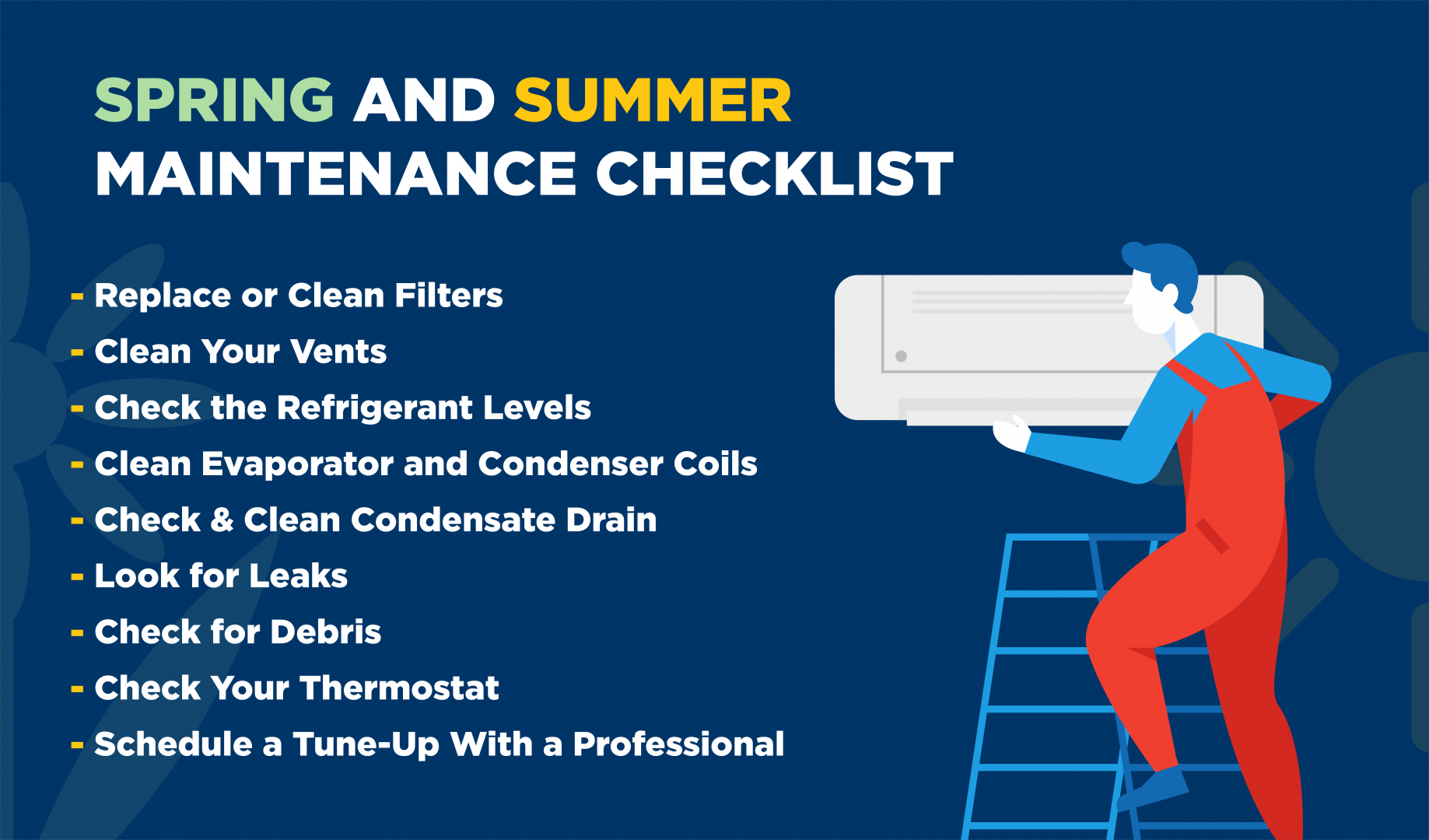
Fall and Winter Maintenance Checklist
Just as in the spring, the fall is a great time to revisit your HVAC systems. Before the weather gets too cold, it’s important to make sure your heating system is ready for the winter. Now that temperatures are dropping, your air conditioner will also need some TLC after keeping you nice and cool all summer long.
Change Filters: Air conditioning systems require regular filter changes, typically about every three months. The end of the summer is a perfect time to swap it out so that the dirty filter isn’t sitting inside your AC unit all winter long.
Check Electrical Connections: Do a tour of all HVAC systems in your home to ensure that they are plugged in properly. You should also have an HVAC technician measure the voltage and current on motors as part of a maintenance visit.
Check Fuel Connections: Look for leaks and dirt around gas or oil tanks and burners. Also, check the heat exchanger for cracks and make sure that the burner flame is blue. Yellow or orange flames can be signs of carbon monoxide release.
Check Thermostat Settings & Calibration: To check the accuracy of your thermostat, use a thermometer to check the temperature of the air coming out of your HVAC system’s registers and compare it to the air setting. If there are any errors, you can find calibration instructions in the owner’s manual for your thermostat or ask an HVAC tech for help. Also, check the batteries and wiring to make sure everything is powered and connected correctly. Finally, adjust the thermostat for the new season - experts recommend setting it to 68° F to ensure the highest levels of energy efficiency.
Inspect Ductwork for Leaks or Damage: The ductwork in your HVAC system is responsible for distributing heated or cooled air throughout your home. Often, you’ll be able to access your ductwork through the basement, attic, or crawl space. Inspect for damage, leaks, and blockages, and check the insulation to make sure it’s in good condition. If you notice any issues, have an HVAC technician take a closer look.
When you first turn your heating system on, check for any strange noises or smells, and look around the units for cracks or leaks. Finally, after you’ve done your own maintenance, have an HVAC technician come to perform a thorough inspection and clean and lubricate all the other parts of your system. By scheduling professional maintenance, you’ll be able to count on an efficient and reliable heater that will keep you warm throughout the winter season.
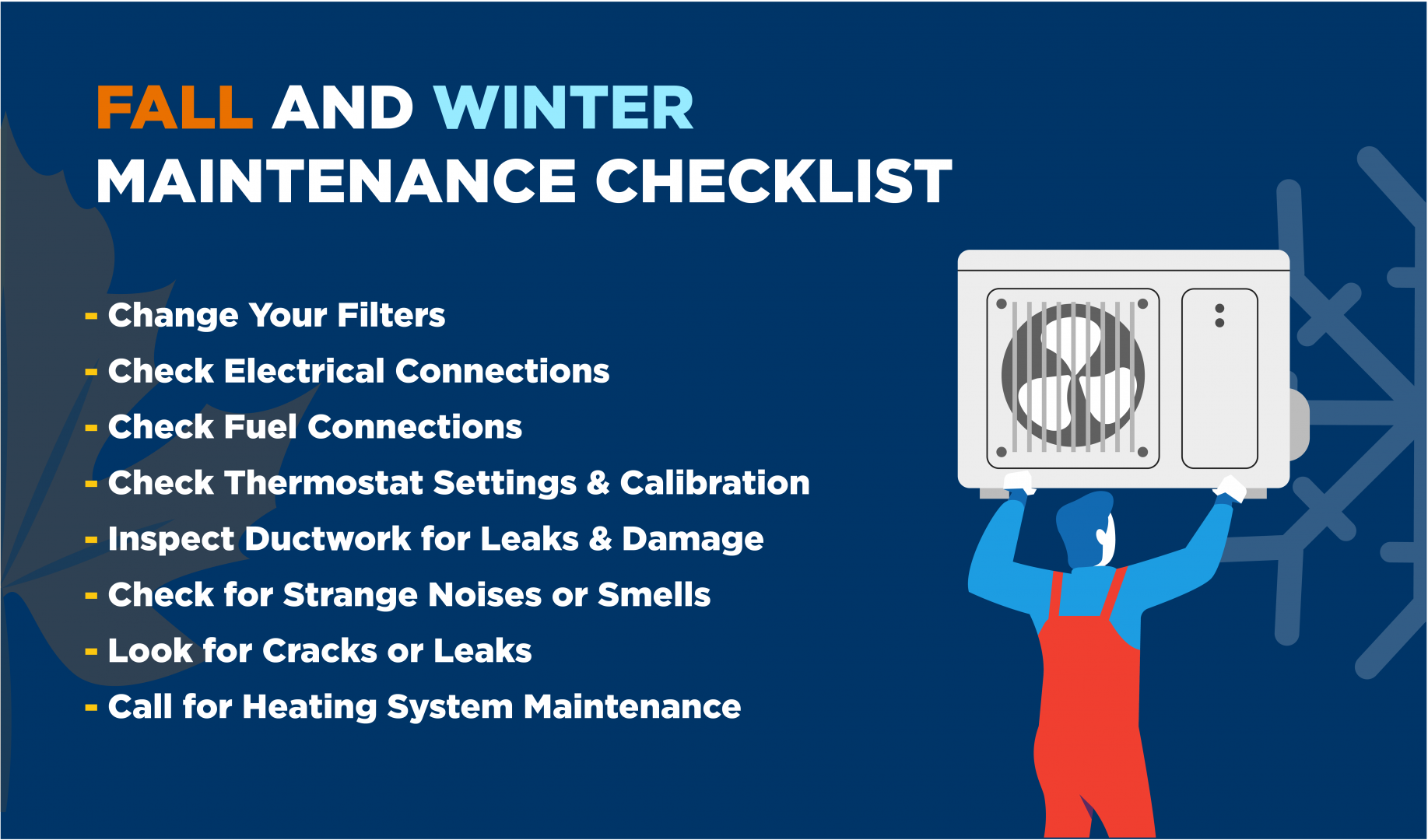
HVAC Maintenance: Recapped
As you’ve learned, regular HVAC maintenance is crucial for ensuring that your heating and cooling systems run efficiently and last for many years to come. There are several types of maintenance, including reactive, predetermined, preventative, condition-based, and predictive. And, while some maintenance can be tackled by homeowners, it's best to call in a licensed HVAC technician for the most comprehensive service.
For heating and cooling systems that are reliable and efficient throughout the seasons, experts recommend that you schedule a professional HVAC maintenance service at least twice a year. During a maintenance visit, an HVAC technician will perform a variety of tasks, including cleaning air filters, cleaning and lubricating parts, checking refrigerant levels, and inspecting the unit for signs of damage.
Without an HVAC maintenance plan, you risk higher utility bills, unnecessary wear and tear on your systems, and potential HVAC system emergencies or breakdowns. If you notice any issues outside of regularly scheduled maintenance, it is important to call an HVAC tech right away to avoid any major damage.
In conclusion, with proper cleaning, proactive repairs, and a little TLC, your heating and cooling systems will be in good shape for years to come. To get started with HVAC maintenance for your heating and cooling systems, contact your local HVAC technician today!



